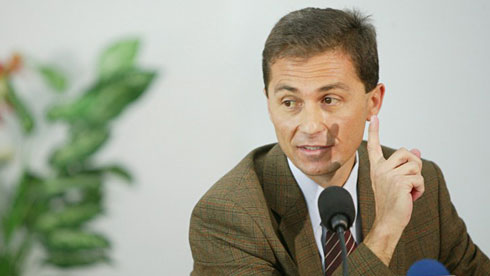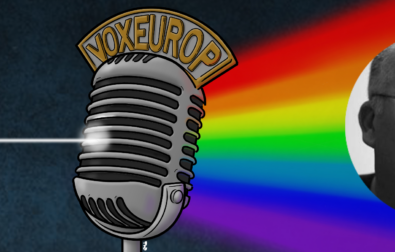The departure of Daniel Morar on April 5 from the post of First Deputy of Prosecutor General of the High Court of Cassation and Justice has annoyed a lot of people. What has annoyed them is not the departure itself – which has delighted more than a few – but the way he did it: by publicly denouncing the political agreement between right-of-centre President Traian Băsescu and left-of-centre Prime Minister Victor Ponta on the appointment of chief prosecutors [to the High Court and to the National Anti-Corruption Directorate – the DNA]. Most expected that he would stay silent and swallow the Ponta-Băsescu deal, especially after the president appointed him as a Constitutional Court judge.
But Morar, former head of the DNA, feels indebted to no one and remains free to do his job to the end. “Băsescu’s man”, as his detractors once called him, began his career by challenging the president [ who was at the time, minister of transport] over the "The Fleet File" scandal [concerning alleged corruption in the privatisation of the Romanian merchant fleet in the 1990s] and finished it by taking up antagonistic positions towards politicians on left and right. He left the system after nearly eight years of investigations, proving, right till the last moment, that he is what people have always described him as: a thoroughbred attorney.
I knew Daniel Morar before he took over the reins of the DNA. The minister of justice, Monica Macovei, had called me in 2005 to ask me to come and meet someone she was thinking of proposing as the head of the national anti-corruption prosecution service, not yet called DNA at the time. I accepted.
Appearance belies forcefulness
I remember only that he spoke little but very emphatically, with a strong Cluj accent [a town in the northwest of the country], and that his face had a sickly pallor. I no longer remember the details, but I do remember what I told Macovei when she asked me what I thought of him. Only half in jest, I said: “He looks like he would be just about capable of arresting you if he caught you trying to break the law.” This seemingly frail native of Transylvania, going on 40 at the time, always had a serious expression. A strange forcefulness emanated from him, and he had an abrupt turn of phrase. His gaze was piercing, his conversation abrupt and to the point.
The American ambassador in Bucharest, Mark Gitenstein, later publicly expressed his admiration for him, once he had become the head of the DNA. During a visit by the Attorney-General of the State of Delaware, Beau Biden (the son of the US vice president), the ambassador, a former lawyer, recounted that the representatives of the State Department had only praise for this attorney. Gitenstein in turn called him the “the definition of an attorney”. I think that's the best description. Morar embodies the austerity of the prosecutor who is completely devoted to his work.
Sentencing former Prime Minister Adrian Năstase to a prison sentence early in 2012 – the prime minister under whom major inquiries were unimaginable and foolhardy prosecutors were dismissed – has broken the myth of impunity, deep-rooted in the Romanian political imagination, and generated a wave of panic. Under Morar, the DNA probed into all the strata of Romanian society infected by corruption: government, parliament, local administration, justice, police, customs, sport. In many cases, the tentacles of corruption were ripped out, as they were in the Customs office.
Romania has produced very few shining characters capable of changing minds and systems and of preserving their credibility and integrity intact. Daniel Morar ranks among them. Will the politicians in power, whoever they will be, repeat the “error” of leaving to chance the leadership of such opposition and allow free men to exercise that office, as they did with Morar? Very unlikely: too many businessmen, high-flying politicians and other influential figures have seen that, without networks of corruption, without confidants planted in key positions within the justice system, there was nothing to guarantee them impunity. For them, the presence of men like Morar at the head of the anti-corruption prosecutors dragged them back down among the little people.
Backsliding long overlooked
Western diplomats, in Washington and London, have quickly arrived at the conclusion that the process of appointing new chief prosecutors [by a political agreement] must be supported without equivocation, to close the vacancy that has already remained unfilled for a whole year. But to believe that the name of the person who leads an institution in Romania is unimportant is a great mistake. This typically western reasoning works in democracies that are already well-rooted. Romania, though, lacks a verification and control mechanism that could bring equilibrium to the system and assure that those who head the institutions are free to work without interference. If the heads of key institutions are capable people, with a reformist will, things move along nicely. If not, the old status quo is back. “Have you Romanians not been able to come up with anything more serious after 23 years of democracy?” Alas, the answer is no.
With prosecutors that are poor or weak, the western Europeans will soon learn where the error lies. Similarly, the backsliding of Budapest was treated indulgently for so long that it can no longer be remedied. Hungary overstepped democracy’s red line long ago.
In the meantime the European Commission has announced that it has not changed its judgment on the shortcomings of Bucharest in matters of corruption, expressed in the last report of the Mechanism for Cooperation and Verification [regarding accession to the Schengen area], regarding the need for a transparent selection procedure for new chief prosecutors.
Was this article useful? If so we are delighted!
It is freely available because we believe that the right to free and independent information is essential for democracy. But this right is not guaranteed forever, and independence comes at a cost. We need your support in order to continue publishing independent, multilingual news for all Europeans.
Discover our subscription offers and their exclusive benefits and become a member of our community now!












